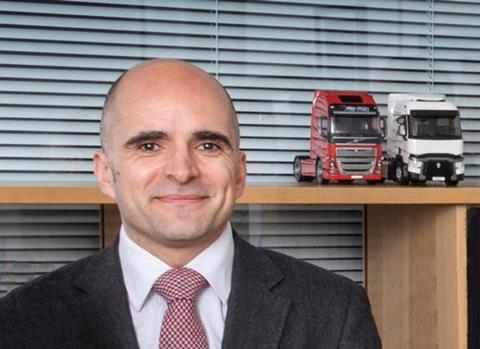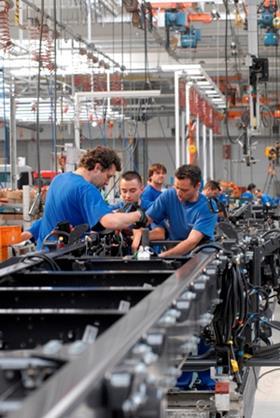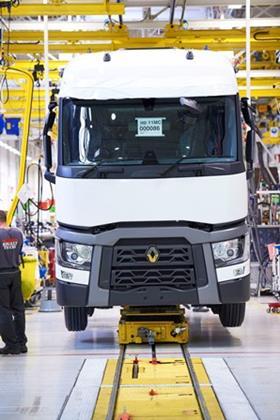
With exactly 12 months to go until the UK is due to leave the EU, there are still huge uncertainties surrounding the UK’s post-Brexit trading relationship with the EU. The FTA is advising members that anything better than a ‘no-deal’ Brexit - that will see the UK trading with the EU27 members under World Trade Organisation (WTO) tariffs from March 29 2019 – will be ‘a bonus’.
This is a difficult enough scenario for UK and international hauliers to plan for, but it is a world of pain for European truck manufacturers faced with the prospect of tariffs on vehicles imported into the UK, the possibility of emissions and other standards diverging as the UK starts to plough its own legal furrow, and delays in vehicle and parts imports at the UK border if the new and untested customs declaration system fails to perform.
These are questions which Carlos Rodrigues, chief financial officer, UK and Ireland, of Volvo Group is already pondering as the truck maker lays plans for supplying the UK after it leaves the EU single market and customs union. Volvo and Renault trucks for the UK market are currently built in the EU so a no-deal Brexit could see significant price rises, especially if the UK applies the same 10% to 22% tariffs that the EU currently levies on finished trucks imported from outside the single market. Parts and components typically attract a 3% to 4% tariff.
“Under WTO, tariffs would apply to everything that crosses the border,” he says. “Depending on what is traded and how it is classified, trucks, components and parts coming to the UK would attract a tariff of 4%, 5%, 8% or 10%. Some categories might be exempt but these are the things we need to understand.”
Only one large volume truck manufacturer – DAF – currently assembles some vehicles in the UK, so it could have a slight price advantage as its UK labour costs would be tariff-free. Could Volvo look at setting up a UK assembly plant for Volvo and Renault trucks to reduce its import tariffs or would the cost of creating such a facility from scratch be prohibitive?

“We would always try to produce where it is most suitable,” says Rodrigues. “These are very complex issues – it is about where we source the parts, logistics, stock capacity etc. So it is difficult to give a straight answer to that right now. It is too early to say and we have not made any final decision – we are still investigating and waiting for the government to decide what Brexit will look like.
“Most of our competition is in the same situation. These are massive decisions and the sooner the government gets it sorted the better.”
Volvo Group strategy is to manufacture Volvo and Renault trucks separately, and while the two companies share a head office in Warwick where our interview takes place it would be a big step to set up a joint assembly plant for the UK.
“There are no plans for any joint manufacturing,” says Rodrigues. “Each brand has its own destiny. That is the view of the group and that’s how we operate the business in the UK. Outside this building we have two brands and two networks, and we use that to gain overall market share. They are very different products and there are Renault customers and there are Volvo customers.”
Type approval
The situation for truck manufacturers is further complicated by the fact that most vehicles come to the UK as chassis cabs and have the bodies built in the UK under EU whole vehicle type approval, national small series type approval or individual vehicle approval. How this process will work in future remains uncertain, and the European Automobile Manufacturers Association (ACEA) has called on the UK and EU27 to maintain “legislative compatibility” to ensure current type approvals arrangements remain valid after Brexit.
“Some body builders are based in the UK and some are in Europe,” says Rodrigues. “How will that work out? Will the UK body builders take advantage or will the European body builders come to the UK?”
Whether the UK will keep its national Construction & Use and exhaust emissions standards aligned with the EU is also far from clear. While the UK is a significant market, with around 35,000 heavy trucks sold each year, it would be a concern for all manufacturers if UK standards diverged from the rest of Europe.
“As an industry it would be easier if everyone kept to the same regulations,” says Rodrigues. “If we have a market of 65 million people with separate regulations from the ones for 300 million people in Europe it starts to be more expensive. It would create unnecessary cost for operators and customers. Having similar regulations in the UK and the EU would be the best outcome.”
Local authorities such as London’s TfL are already imposing their own safety and environmental requirements such as the Direct Vision Standard and low emissions zones, and Rodrigues – who has been in this country for two years - worries that the UK might impose even tougher standards than the EU in future.
Forefront
“From what I have seen, the UK will continue to be at the forefront of health and safety and carbon emissions standards,” he says. “Maybe the UK will be the leader and the EU will follow some of the UK’s initiatives. It will come down to cost – if the UK is so advanced compared with the EU regulations and standards that will require more R&D cost for the industry.”

The UK is already unusual in that 6x2 tractor units are far more popular here than on the continent, a preference that has been holding back the development of natural gas powered vehicles – until now. Volvo has developed the FH LNG 6x2 developing 420hp or 460hp and an operating range of up to 1,000km which should prove popular with environmentally-aware hauliers needing the ability to pull 44 tonnes.
The UK market for trucks over 6 tonnes fell almost 3% in 2017 to 45,000 units after two years of strong sales of Euro-6 trucks, with Q4 2017 nearly 10% down on the same period in 2016. Economic uncertainty coupled with a weak pound and the worsening driver shortage as foreign drivers start to head of home could see 2018 sales drop further.
“We have seen a high market for the past two or three years and the natural trend is we will see it go down this year,” says Rodrigues. “How much is difficult to say. Everyone thought the market would go down 20% post Brexit but it’s still there. Will there be a pre-buy before March 2019? There are so many variables.”
So far stiff competition between the truck makers has meant that the full effects of the devaluation of the pound against the euro have not been passed on to truck buyers, according to Rodrigues.
“The pound fell 20% against the euro after the Brexit vote, but prices have not increased 20%,” he says. “The market price is the market price. We have to keep a balance between securing market share and getting the right price. If people will pay £350 a week for a tractor that is the price and it hasn’t really changed in the past two years.
“General price inflation in the UK is around 3% and that is probably what the truck market has done as well.”
Customs delays
Quite apart from the Brexit effect on truck and parts prices, the huge jump in customs declarations that will be involved in UK-EU trade could see delays at the borders for imports of vehicles and spares. The UK is already short of warehouse capacity so is Volvo making plans to increase its stocks in the UK in readiness for 2019?
“We have a support warehouse in Rugby so we have the infrastructure to make sure we will continue to deliver customer satisfaction,” says Rodrigues. “Volvo and Renault will do whatever it takes to make sure we have the right parts and components available to our dealers to maintain high levels of vehicle availability.”
At present Volvo Group supplies the whole island of Ireland from the UK, but the imposition of some kind of border between the Republic and Northern Ireland might see this strategy change.
“We will have to review how we supply Ireland,” says Rodrigues. “If there is a hard border then Ireland will remain part of Europe and we will have to look at the best logistical routes to service our Irish customers. The existing customs declaration system was designed for the UK to stay in the EU so it could be an issue.”
Skills shortage
The other concern for truck dealers and by association the importers is the shortage of skilled technicians able to work on modern high tech vehicles. Volvo has responded by developing its apprenticeship scheme in the UK to ensure its dealers’ workshops have a steady supply of talent.
“We are investing in making sure we are at the forefront of apprentice training,” says Rodrigues. “This is paying off as we have increased customer satisfaction in our dealer networks for both Renault and Volvo brands. We have to make sure the dealerships are attractive places to work with decent facilities and that the mechanics can develop their careers with us. That is what we do.”
Uncertain times
In a statement, Volvo Group adds: “With regard to the effects of Brexit on the Volvo Group, we always refer to the common ACEA position on Brexit to which we have contributed. The automotive industry wants access to each other’s markets with regulatory harmonisation on areas such as type approvals, emission legislation, CO2, safety etc.
As nobody knows what the outcome of Brexit will be and no company wants to reveal competitive information such as data on its business interests or present flows of components or similar between UK and EU the ACEA position is on a very general level and a bit outdated.
What we can say is that all companies with or without manufacturing in the UK will be affected if customs are implemented on all imports/exports between EU and UK. As there are doubts that the negotiations will achieve a trade agreement before March 2019 there is a strong wish from the whole business community for a transition period preferably keeping things as they are today until a trade agreement is in place.”













